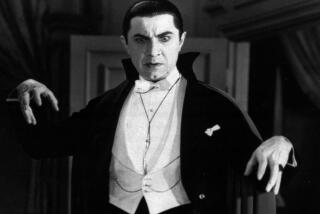Walter Mosley goes the Mickey Spillane route
Diablerie
A Novel
Walter Mosley
Bloomsbury: 184 pp., $23.95
*
At first glance, Ben Dibbuk has a pretty good racket. The protagonist of Walter Mosley’s new novel, “Diablerie,” makes a six-figure salary as a computer programmer at a New York bank. He and his wife, Mona, a freelance magazine editor, live on Manhattan’s East Side, while their 19-year-old daughter studies downtown at New York University.
The 47-year-old Ben also keeps a young Ukrainian lover on the side. Despite it all, our narrator sleepwalks through life, sticking to his regimen, untethered by any kind of emotion: “I don’t hate anybody,” Ben admits, all the while thinking, “nor do I love or fear or worry about anyone.”
Thankfully, as writers from Jane Austen on have shown, a routine life does not have to make for a routine book. Add to this the fact that Mosley’s latest is noir, a genre built on ordinary people being thrown into extraordinary situations. And so it happens: At a party for his wife’s new employer, Diablerie (which “can mean either mischievous or evil,” Mona tells him), Ben meets a woman who says she’s a long-lost acquaintance. She alludes to a tragic shared past; he, however, doesn’t know her. But then, he doesn’t know who he is either: She alludes to Ben having committed a violent act more than two decades earlier, but he doesn’t believe he’s capable of such violence.
This ambiguity has great potential because it revolves around the question: What makes a man? “Diablerie” is anti-existential in that its lead character is defined by absence: Ben can’t remember huge chunks of his premarital life because they were spent in an alcohol-fueled haze; in addition, he’s fundamentally soulless. (Ben refers to the “void” inside him, and his surname alludes to the wandering, pernicious spirit known in Jewish folklore as a dybbuk.) But unlike authors Georges Simenon or Jim Thompson, who made a bleak, misanthropic worldview (especially when funneled through an amoral narrator) hypnotically compelling, Mosley doesn’t give the black hole inside Ben any kind of gravitational pull on the reader.
Amnesia (dubbed “film noir’s version of the common cold” by writer Lee Server) is one of the great tropes of genre fiction because it involves people (re)discovering themselves and their capabilities. Alas, the way it’s approached here is not only conventional but also completely unconvincing and uninvolving.
Because Mosley is an experienced writer with close to 30 books to his name (many of them critical and popular hits, such as the Easy Rawlins series), the wonky plot of “Diablerie,” burdened with holes and contrivances, is surprising. For instance, it’s not a problem that Ben has only one true friend, Cassius Copeland, his colleague and security expert (with a conveniently ill-defined background), but their importance to each other is never fully developed. When Cassius comes to Ben’s rescue -- going so far as to suggest that he’d kill someone to help his beleaguered pal -- it feels like an expedient trick rather than a logical step. And because this is a stand-alone novel, readers aren’t invested in a recurring character like Rawlins that might help them overlook structural and stylistic bugs.
Most jarring is Mosley’s take on sexuality. At times it seems as if we’re reading Mickey Spillane, with women who are either double-crossers or are enthralled by dominating males. Mona may demurely chastise her husband for his “gutter mouth,” but when she’s with her lover, she blabbers with the expertise of a phone-sex operator. Meanwhile, Ben’s relationship with Svetlana strains credulity. Granted, he pays her rent, but it’s hard to believe that an attractive 21-year-old grad student in international relations would fall for a much older and, frankly, dreary computer programmer, and act like an insatiable sex machine prone to greetings such as “I have missed you. I want to make love.” In the hands of a Joe Eszterhas (“Basic Instinct,” “Showgirls”), a sex thriller can have a gleeful, somewhat liberating vulgarity; here, the sexuality is all constipated tension with only mechanical release.
When child abuse assumes a prominent role in the plot, things get even more awkward with such smarmy confessions as “I didn’t clean up, Mom. I gave up. I stopped feeling. At least when I was drunk I was feeling something.” This narrative approach may have been more effective had the action been set in the 1950s and 1960s, as in the Easy Rawlins books; here it just feels dated, as do the clunky attempts at humor. (When Ben is handcuffed by a black and an Asian cop, he remarks, “I was in the custody of the military arm of the Rainbow Coalition.”)
The author sometimes signals that a character is using cliched hard-boiled language on purpose and with a certain ironic or, more interestingly, manipulative self-awareness; alas, this comes across as lazy.
Mosley is a prolific writer who has accumulated a lot of goodwill. It’s a pity to see him squander it with a book that’s rough in all the wrong ways.
--
Elisabeth Vincentelli is arts and entertainment editor at Time Out New York.
More to Read
Sign up for our Book Club newsletter
Get the latest news, events and more from the Los Angeles Times Book Club, and help us get L.A. reading and talking.
You may occasionally receive promotional content from the Los Angeles Times.







